Cavity Treatment

Contents
Don’t you think that if you have a cavity, you just have to go to a dentist and get if easily fixed?
If you have a cavity that is not in the very early stages of decay, it is safe to assume that you already have a hole in your tooth. The hole is irreversible.
By the time subjective symptoms appear, the decay has progressed to the dentin inside the enamel, and you can assume that there is a significant hole in the tooth. When you think about it, it is better to see a dentist as soon as possible, before it becomes painful, right? This page describes how to treat cavities and the pain they cause.
Cavity progression and treatment methods
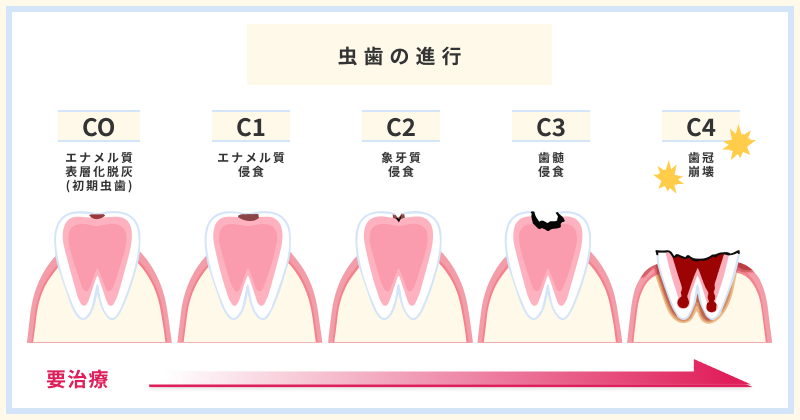
| Stage | Symptoms | Treatment |
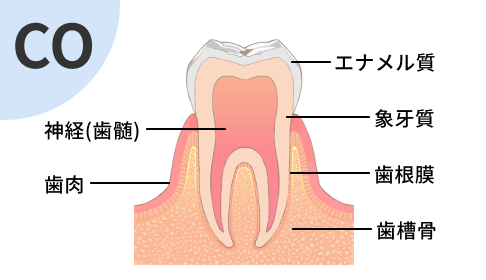 | No symptoms | Often no treatment is needed and it can be cured with proper brushing and fluoride application. |
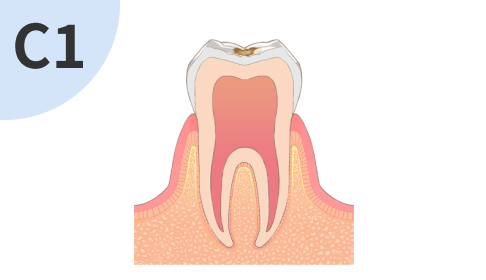 | The enamel on the tooth surface continues to dissolve and darken. Cold foods may sting. It may also cause discomfort when touched with the tongue, or food may stick. | The affected area is scraped away and the hole is filled with resin (dental plastic). |
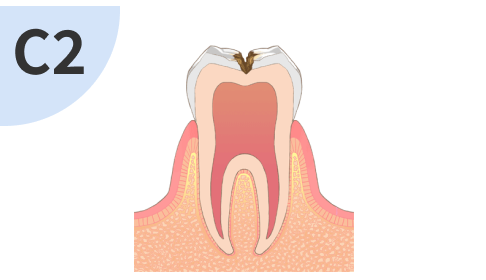 | A condition in which the decay has progressed to the dentin, which is inside the enamel. Cold or sweet foods can sting and sometimes hurt, and most patients notice the cavity at this stage. | The decayed area can be scraped and filled with composite resin, or a metal filling can be placed after a mold is made. Depending on the condition of the cavity, the entire area may be covered with a cap. |
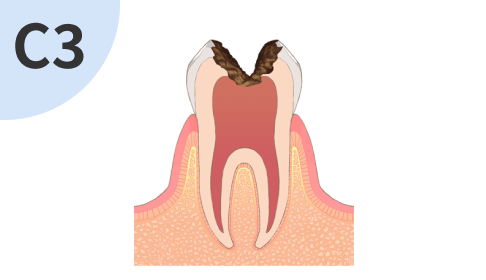 | The cavity has reached the pulp (nerve), which is further into the dentin. When the cavity has progressed to this point, hot food may stain or throbbing may occur even without doing anything, and some patients come to the dentist because they can no longer stand the pain. | The affected area of the cavity can be scraped and filled with composite resin, or a mold can be made and a metal filling placed. Depending on the condition of the cavity, the entire tooth may be covered with a crown. |
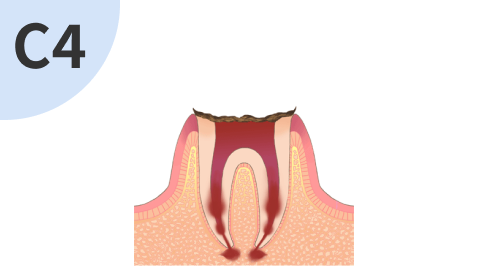 | If the tooth has progressed to this point, there is little tooth left, the nerve has died, and the tooth is no longer painful. However, if pus accumulates in the root of the tooth, the pain will return. Also, if it progresses to the bone, severe pain occurs. | In many cases, extraction of the tooth is necessary. In the case of tooth extraction, dentures, bridges, or implants are options. |
Root Canal Treatment for Advanced Cavities
If the cavity has reached the nerve, the tooth may need to be extracted, but root canal therapy increases the likelihood that the tooth can be saved.
The root canal is the canal inside the tooth that contains the nerves and blood vessels. If the decayed tooth reaches the root canal, the tooth will not function and will need to be extracted. Root canal treatment is necessary to avoid tooth extraction.
Root canal treatment must be done at a clinic to ensure complete healing
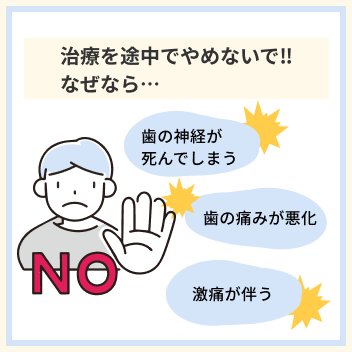
Never stop in the middle of the treatment!
As in the advanced stages of tooth decay, there are no symptoms at first, then symptoms appear, throbbing pain occurs, the tooth nerve dies, the tooth stops hurting, and further deterioration is accompanied by severe pain.
If you think that the pain is no longer “painful” and you decide on yourself that you do not have to go to the dentist anymore because the pain is gone, you might actually make the situation way worse.
Causes of pain after cavity treatment
Sensitive nerves after the treatment
Nerves are sensitive to vibrations and other effects during cavity treatment, making them more susceptible to pain.
In some cases, the nerves are temporarily hypersensitive and reactive.
This will gradually subside by resting as much as possible to avoid irritation.
The nerve is inflamed
It is possible that the decayed tooth has already penetrated the nerve.
When a tooth’s nerve is damaged and weakened, it often throbs and hurts. Unless the nerve is severely inflamed, we do not remove it in the hope that the nerve will recover.
Fillings and caps irritate the nerve
Fillings and caps can put pressure on the nerves.
Also, because the nerves are hypersensitive after treatment, combined with heat conduction from the metal and other materials, they can be easily irritated, and eating cold or hot foods can cause pain.
Usually, the pain disappears in a few days, but if the pain persists, it is recommended to consult a dentist as there may be other causes.
The nerve was not cut
If you have throbbing pain after a root canal, it is possible that the nerve was not cut.
If the root of the tooth is a complex structure and the nerve was not removed, the treatment will need to be repeated.
Be sure to consult with your dentist.
How long will the pain last after the cavity treatment?
After a cavity treatment, the nerves are sensitive and, in combination with the thermal conductivity of the filling or cap, can cause discoloration or throbbing.
In most cases, symptoms of toothache after treatment will subside within a few days.
If the pain is unbearable, please consult your dentist.
What to do when you want to suppress toothache
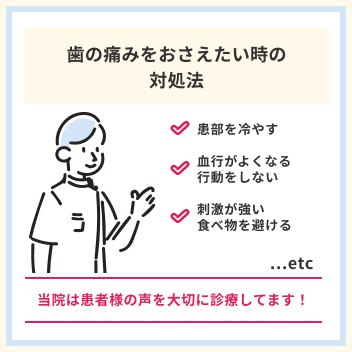
・Take painkillers
・Avoid eating irritating foods
・Avoid activities that increase blood flow, such as drinking alcohol, prolonged bathing, or strenuous exercise
・Avoid touching the area around the tooth after treatment
・Keep the area cool
While it is important to take pain relievers, it is also important to manage the pain by avoiding activities that stimulate the affected area or increase blood flow throughout the body to prevent the pain from getting worse.
The Toranomon Hills Dental Medical Ryu Clinic offers free consultations for a variety of dental problems.
You can be sure that we will always make suggestions that are appropriate for your situation and that we will always work with you to determine the best treatment plan.
Please do not give up and consult with us first.




